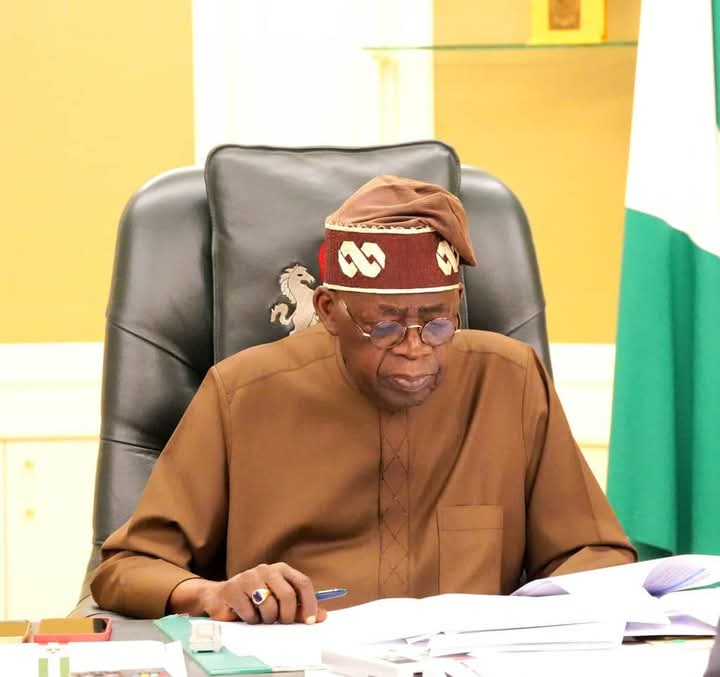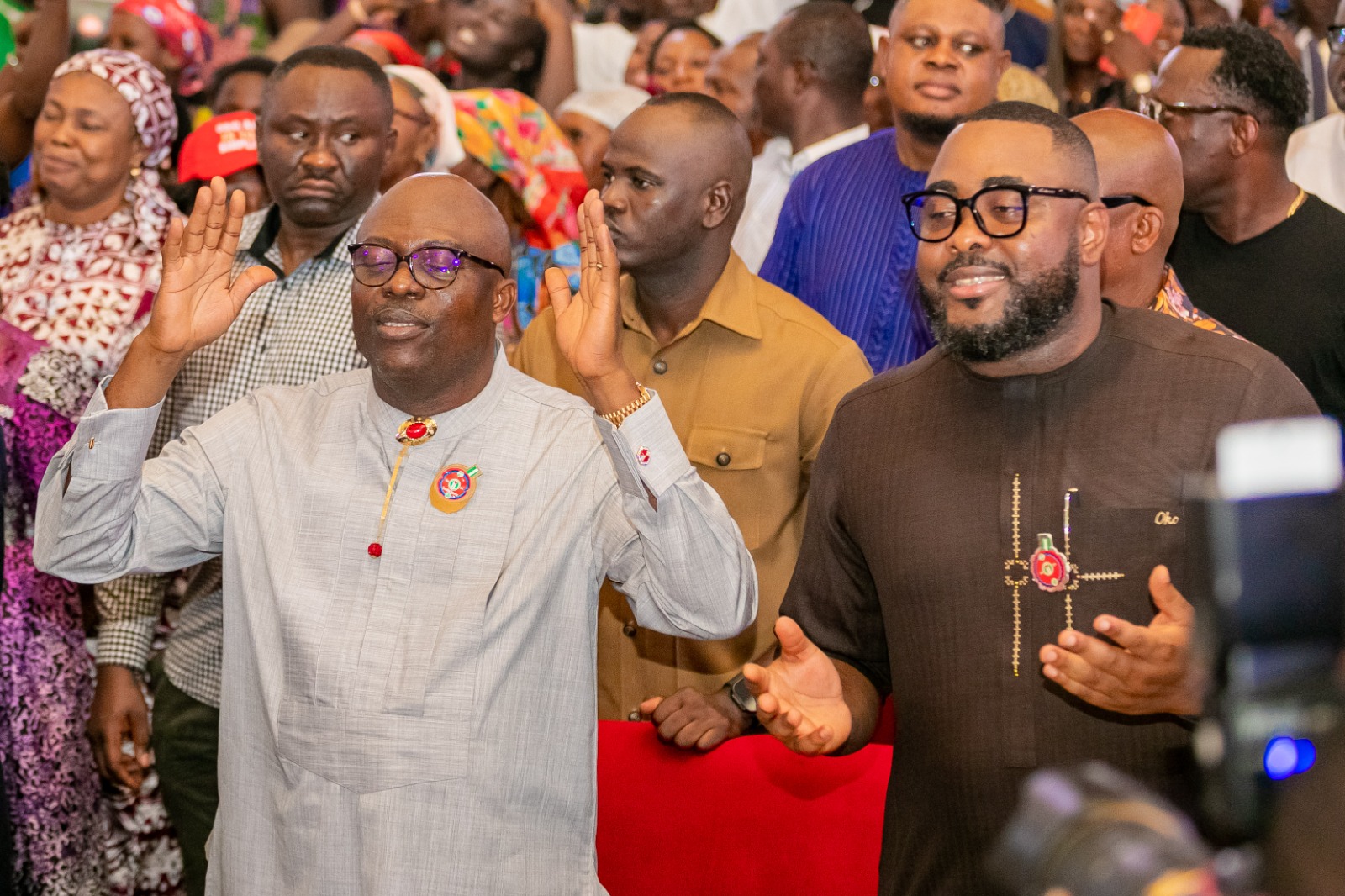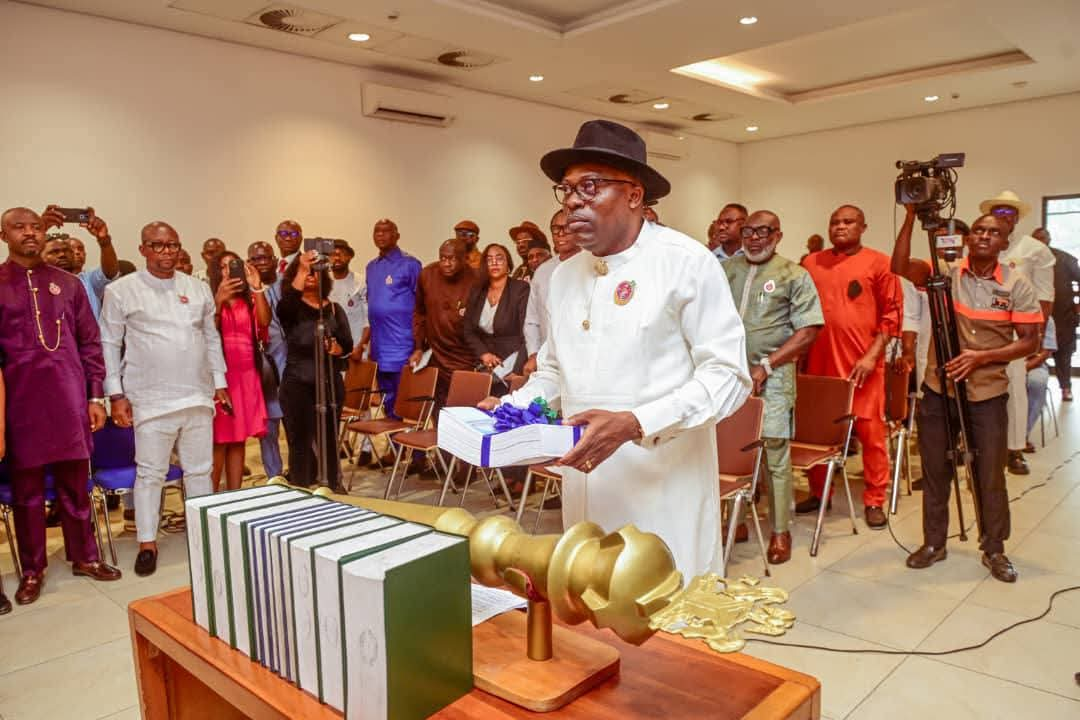Editorial
Governance And Peer Review Mechanism
The Nigerian governance structure is predicated on the principle of federalism. The implication is that there are other levels of governance in Nigeria that make up the federation. Government at the Centre exercises exclusive list in certain areas of governance and enjoys concurrency with state Government in others. In principle there should be a residual list of governance items, but this does not exist in actual practice as the local government administration is yet to enjoy full autonomy.
The various state Governments exercise concurrent list of governance items with the federal government in such areas as Education, Road infrastructure, Health, Environment and others.In the area of security, the constitutional provision which states that the business of Government is the protection of lives and propertyof citizens applies to all the levels of Government.However, the convoluted nature of governance structure where the federal government is in control of too many governance items has made the management of security architecture by the states very difficult, but not impossible. Governors who are described as the chief security officers of their states, cannot not have full control of the Armed forces and police. For example the commissioners of police take instructions from the Centre, precisely from the Inspector General of Police.
The states and local Government areas are the closest government to the people. This gives the states gargantuan responsibilities and challenges. The states owe their citizens more responsibilities than the federal Government but have limited resources and powers to accomplish them despite their potentials in natural resources and revenue generation. Unfortunately, the states are held down by the absence of Fiscal Federalism in the Nigerian Federation.
These challenges and more have affected and afflicted development in the states in the areas of infrastructural development, poverty alleviation, environmental control, security and human capital development.Some commentators are of the opinion that the impoverishment of the states by the federal government is partly responsible for the spread of insecurity, growing agitations and secessionists tendencies in Nigeria.
Peer Review Mechanism can be a major tool which the states can use to alleviate their burden. It is in consonance with the local aphorism that problems shared are problems solved. Peer review mechanism can be referred to as self-assessment for good governance by peers in similar enterprise.
For example, peer review mechanism is an instrument of Governance among African States tagged the African Peer Review Mechanism (APRM) .It is a mutually agreed instrument which member states of African union acceded to as a”self-monitoring mechanism”. This self-assessment is to encourage conformity with regards to political, economic and corporate governance values among member states. It is important to observe that the African union Agenda 2063 and sustainable Development Goals 2030 have been monitored and evaluated by AU members through Peer Review Mechanism instruments.
Simply put peer review is the evaluation of values by one or more people with similar competencies. Governors of states who are saddled with governance challenges can go into self-assessment of their governance capacity by looking at what other governors have done in their states, evaluate and copy for the development of their own states.It could also be a source of motivation for good governance.
Peer Review Mechanism is not a copy and paste mechanism, it should be a positive way of avoiding the pitfalls of a particular governance style while evaluating and copying what is good.Peer Review Mechanism as an instrument of governance in Nigeria has very fertile pedestal. Different regions in Nigeria have platforms where their Governors gather to foster social, political and economic integration. These groupings are envisioned to rub minds on development issues in their various states. In the south-south there is the BRACED.There are others including the South East Governors forum, South West Governors forum and the various Governors fora of political parties as well as the southern Governors forum recently convoked.Governors in these groupings can pick up models of development from their colleagues after thorough evolution of such projects on how they can impact meaningfully and add values to their constituents. For example, the south East Governors can copy models of development from Ebonyi State where the Governor has defined Governance through infrastructural development and little bits of what other Governors are doing.
Governor NyesonWike stands tall in the south-south. There are so much the Governors of south-south and indeed Nigerian Governors can learn, from him, especially his prowess in prudent management of Resources, Revenue Generation and infrastructural development, particularly in the area of Road infrastructure, tertiary education and Health. The sign posts in these areas of development are models that can be copied by sister states.
Also, Lagos state as the center of excellence and industrial development has a lot of exemplary blue prints and projects execution that other states in the west and even the country at large can copy. It only requires a proper study and evaluation.So many states in Nigeria picked the traffic control model of Lagos state in their LASMA scheme. This is a good example of peer review in the right direction. Recently the Nigerian Guild of Editors went to kano for their Bienal convention and one of the highlights of their trip was the inspection of projects embarked upon by the kano state Government in the last six years.
What stood out in all the projects executed by Governor Ganduje is the security infrastructure. The entire state capital is covered with CCTV Cameras that monitor every movement in and around the metropolis. This model in security architecture can be copied by the states in the North especially in the North East to stem the tide of insurgency and banditry in the region. This is what Peer Review Mechanism entails.
Let the Governors exchange ideas and rub minds to move their state forward in the realm of development.
Editorial
No To Hike In Telecom Tariffs

Nigerians are outraged by the Federal Government’s approval of a 50 per cent increase in telecommunications tariffs, with organised labour threatening to mobilise workers to boycott telecom services. The Nigeria Labour Congress (NLC) and the Trade Union Congress of Nigeria (TUC) have described the upcoming tariff as outrageous, lamenting that it will worsen the already harsh living conditions of workers and the masses.
Similarly, the Coalition of Northern Groups (CNG) rejected the hike, stating that it was ill-timed and did not take into consideration the struggles of Nigerians. The Human Rights Writers Association of Nigeria (HURIWA) also criticised the review, calling it an illegal, unconstitutional, and oppressive policy that undermines the fundamental rights and freedoms of Nigerians. It is a difficult moment for the industry.
Recall that the Nigerian Communications Commission (NCC) approved a 50 per cent increase in tariffs for telecom operators last Monday, instead of the 100 per cent raise that operators had requested. This decision quickly angered the consumers’ association, which criticised the government’s approval as not only punitive but also insensitive.
We wholeheartedly agree with the stance of labour and other groups on this very sensitive matter. We unequivocally condemn the 50 per cent increase in telecom tariffs. Though telecom operators cite higher operational costs and inflation as reasons for the hike, the timing and impact raise serious concerns in the current economic situation. It is a blatant attack on the well-being of the Nigerian worker and a betrayal of the people to corporate interests.
Telecommunication services are essential for daily communication, work, and access to information. However, the average Nigerian worker already spends approximately 10 per cent of their wages on telecom charges. For a worker earning the current minimum wage of N70,000, this means an increase from N7,000 to a staggering N10,500 per month or 15 per cent of their salary, a cost that is unsustainable.
This hike exemplifies the government’s apparent ease in prioritising corporate profits over citizens’ welfare. It is shocking that the government approved a 50 per cent tariff increase for telecom companies within a month, yet took nearly a year to approve the recent minimum wage for workers, despite the rising cost of living and inflation eroding purchasing power.
The questions are: When will the government stand up for the citizens it swore to protect? When will the National Assembly rise to its responsibility and hold the Executive accountable for policies that blatantly undermine the welfare of the majority? When will the common man finally heave a sigh of relief in Nigeria? We urge the government, the NCC, and the National Assembly to review the implementation of this ill-advised increase.
It is difficult to understand the state of mind of the managers of the nation’s economy. Sadly, these managers have alienated themselves from the reality of today. How can a government approve a 50 per cent hike in the tariff of telecom services when even the N70,000 minimum wage has been eroded by inflation, electricity tariff hikes, exorbitant fuel costs, transportation, and other social services?
Even if there is a need for an increase, why does it have to be 50 per cent? If, after dialogue, it is agreed that a raise is necessary, we should all consider a more reasonable increase rather than the 50 per cent hike. Fifty per cent is excessive and will only worsen the already harsh living conditions of workers, placing a heavier burden and more suffering on them and the general population.
The recognition of telecommunication services as essential components of modern society cannot be overstated. In an era characterised by rapid digital transformation, these services are fundamental not only for personal communication but also for facilitating broader socio-economic engagement. The proposed tariffs increase in the telecom sector raises critical concerns regarding equitable access to vital services that support communication, education, healthcare, and commerce.
In a democracy, the people should be the central focus of all government actions and policies. Every decision should aim to improve their quality of life. This plan must be carefully scrutinised with the welfare of citizens in mind. An increase in telecom tariffs will negatively impact many Nigerians, as the internet has become an essential tool for business, communication, and daily activities.
The Tide calls for the immediate suspension of the 50 per cent hike in tariffs. Instead, we recommend a more reasonable adjustment of a maximum of 10 per cent, which balances industry sustainability with the current economic realities in the country. We also demand that the NCC engages in genuine, inclusive consultations with consumer advocacy groups, civil society organisations, and other grassroots stakeholders before implementing any tariff adjustments.
Editorial
Hurray, Siminalayi Fubara Is 50!

Born on January 28, 1975, in Opobo Town, Mr. and Mrs. Joseph and Love Fubara welcomed their second of five children and first son. His father, a former soldier who completed an overseas training tour of duty, instilled in him a strong sense of discipline and dedication. His mother, a civil servant, taught him the importance of hard work and perseverance.
He received his primary education at Opobo Primary School and continued his studies at Comprehensive Secondary School in Opobo. His passion for numbers led him to pursue a degree in Accountancy at the then Rivers State University of Science and Technology, now known as Rivers State University.
Upon completion of his Bachelor’s degree, he pursued further education and obtained a Master of Business Administration (MBA) and a Master of Science (MSc) from the prestigious University of Port Harcourt in 2013 and 2016, respectively. Fubara’s dedication to his studies and his commitment to personal growth have shaped him into the accomplished individual he is today.
Sim, fondly called by his colleagues, started his career in 2003 as a principal accountant at the Rivers State Senior Secondary Schools Board. His dedication led to his promotion to Director of Finance and Accounts at the Government House in 2015. In March 2020, he was appointed Permanent Secretary and then became the Accountant-General of Rivers State on December 23, 2020.
His achievements are numerous, as he is a Knight of the St. Christopher (KSC) Order of the Church of Nigeria Anglican Communion. Additionally, he holds the prestigious traditional chieftaincy title of Amaopusenibo of Opobo Kingdom. The Governor’s commitment to family is evident through his marriage to Valerie Ibiere Fubara, with whom he shares three beautiful children.
Among Siminalayi’s other significant qualifications and accomplishments are his fellowship with the Nigerian Institute of Management and his fellowship with the Association of National Accountants of Nigeria (ANAN). He holds membership in the Chartered Institute of Forensic and Investigative Auditors. His impressive background has gained him the trust and support of the Peoples Democratic Party (PDP), leading to his victory in the party’s governorship primaries for the 2023 general elections.
Fubara embodies a leadership style defined by simplicity and compassion. He exhibits patience, confidence, and empathy in his interactions with those he serves. His humility and faith in God make him trustworthy. Representing the younger generation, Sim leads with the slogan “Consolidating and Continuing the New Rivers Vision,” focusing on developing infrastructure, healthcare, education, security, agriculture, and investment opportunities for Rivers State.
The bravery exhibited by His Excellency in resisting godfatherism has attracted respect from a wide array of Nigerians, Africans, and supporters of democracy around the world. He emphasises serving the interests of the people of Rivers over any godfather. His actions unify diverse groups in the state, promoting a sense of belonging among various ethnicities.
Our affable Governor exemplifies robust moral leadership rooted in his Christian beliefs. As a devoted Knight, he shows compassion and selflessness in his governance. He fosters an environment where all religions can peacefully coexist. Fubara sponsored Muslim pilgrims for the 2024 Hajj and personally wished them well, encouraging them to pray for the state and Nigeria. His religious tolerance has earned him respect among Nigerians who value coexistence.
Moreover, the Governor’s appealing physique and charming smile have garnered admiration from many Nigerians, who view physical beauty as a reflection of inner qualities. His tall stature has solidified his status as a revered figure, commanding respect across the nation. Fubara has shown dedication to women’s issues by initiating several programmes in collaboration with the Women Affairs Ministry and the Office of the First Lady, highlighting his strong commitment to women’s empowerment and gender equality.
Sir Fubara has focused on actively involving young people in his governance by launching entrepreneurship and training schemes, notably the Rivers State Youth Empowerment Scheme. His efforts to support youth have earned him the backing of many young Nigerians. Additionally, he provides scholarships and makes donations to orphanages, demonstrating his commitment to investing in education for the benefit of children in the state.
Known for his strong commitment to national unity, this Governor reaches out to Nigerians from various backgrounds. As a state Governor, he demonstrates great nationalism by supporting citizens from other states, especially in Rivers. He respects the rule of law and democratic values, which has enabled past local government chairmen to complete their terms without issues. His effective management of Rivers State’s resources promotes transparency and accountability.
Despite facing numerous distractions, the Rivers Chief Executive has made remarkable strides in steering the state’s affairs, reflecting his unwavering focus and commitment to delivering results. He has encountered challenges but remains dedicated to his vision for a better state. His peaceful and caring leadership style has made him popular, inspiring new leaders to emulate similar qualities. By being strong yet compassionate, he has redefined the concept of leadership. Fubara’s selfless nature prioritises the state’s needs above his own. This has earned him widespread support.
As he commemorates his Golden Jubilee birthday today, even the most ardent critics, adversaries, and accusers cannot overlook that he embodies a worthy precursor in every sense.
Happy Birthday, His Excellency!
Editorial
Fubara’s 2025 Budget Of Inclusive Growth


